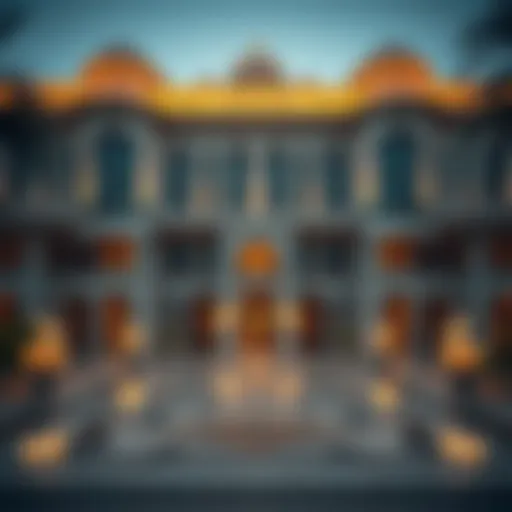The Ramadan Calendar in Dubai: A Comprehensive Guide
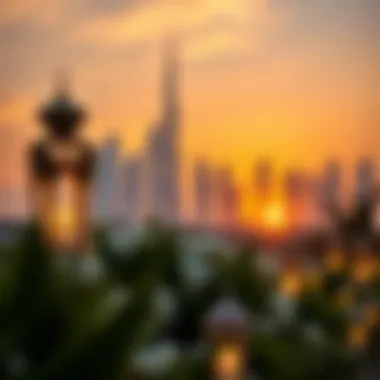
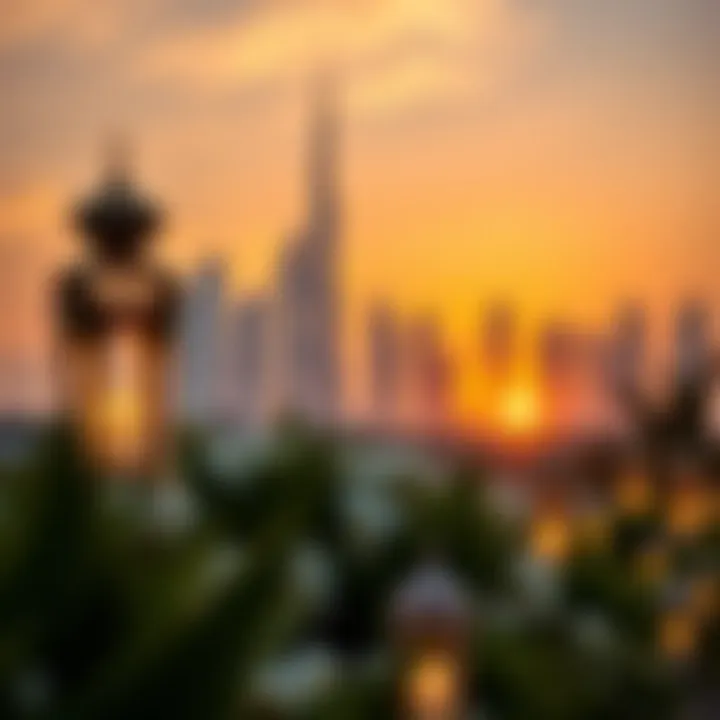
Intro
Ramadan, the ninth month of the Islamic lunar calendar, is a time of reflection, prayer, and community for Muslims around the world. In Dubai, this period is more than just a religious observance; it's a cultural phenomenon that envelops daily life in a unique tapestry of practices and traditions. As the sun sets, the air fills with the aroma of iftar dishes, while sites like the Burj Khalifa provide striking backdrops to devotional gatherings. This guide aims to navigate the multifaceted experience of Ramadan in Dubai, from the intricacies of the lunar calendar to the subtle adaptations in community life and business practices.
Market Insights
Latest Trends in Dubai Real Estate
With the onset of Ramadan, there are subtle shifts in the Dubai real estate landscape that both investors and homebuyers should take note of. Traditionally, the month sees a slowdown in transactions as many families prioritize spiritual commitments and communal prayers over property deals. However, this year, the market is characterized by a growing demand for community-oriented developments, particularly in areas that enhance family time and local engagement.
Dubai's luxury sector remains robust, with upscale properties attracting expatriates seeking a blend of modern living and cultural immersion. Notably, neighborhoods like Dubai Marina and Downtown Dubai have become hotspots for those looking to experience the vibrant atmosphere that Ramadan brings.
"The Ramadan spirit adds a layer of depth to the hospitality and luxury sectors, where properties that emphasize communal spaces witness increased interest."
Impact of Global Events on Local Market
Global occurrences, such as fluctuations in oil prices or shifts in diplomatic relations, naturally exert pressure on local economic conditions. During Ramadan, the impact is particularly distinct. Expats, who form a significant portion of Dubai’s population, often adjust their spending habits. This can translate into fluctuations in rental prices as demand pivots. On the flip side, vacationers visiting during this holy month might bring a surge of interest in short-term rentals, providing cash flow opportunities for investors.
Investment Opportunities
High-Return Areas for Property Investment
For discerning investors, the nuances of Ramadan present unique opportunities. With areas like Al Furjan and Dubailand increasingly coming into view, potential buyers should consider the following:
- Community Vibe: Properties that foster communal interactions, like parks or gathering spaces, are more likely to witness appreciation in value as families seek environments conducive to celebrations.
- Rental Yields: Look for locations where cultural observances, like iftar gatherings, can boost demand during the month, ensuring consistent rental income.
Tips for First-Time Investors
Venturing into property investment during Ramadan? Here are some pointers to help navigate the terrain:
- Timing is Key: While Ramadan may see slower transactions, consider that interest in listings can spike as the month progresses, especially post-Eid.
- Understand Local Culture: Familiarize yourself with the significance of Ramadan traditions to better connect with potential buyers or renters.
- Leverage Digital Marketing: Utilize platforms such as Facebook and Reddit to tap into local forums and discussions around Ramadan-related events or property listings.
For more insights on real estate trends in Dubai, consider visiting Dubai Land Department.
In sum, the Ramadan calendar not only governs the spiritual lives of Muslims in Dubai but also has ramifications for the real estate market. From informed investments to an understanding of communal dynamics, a nuanced perspective on this holy month can greatly enhance one's engagement with the city.
Understanding the Ramadan Calendar
The Ramadan calendar is much more than just a way to keep track of the days; it is an essential element of the larger observance of Ramadan in Dubai. This period holds deep significance for millions, as it fosters a communal atmosphere where faith, family, and reflection blend seamlessly.
Understanding this calendar is crucial, particularly for those investing or settling in Dubai, where cultural dynamics are richly woven into the fabric of daily life.
Historical Context of Ramadan
Ramadan is rooted in rich historical traditions, dating back to the time of the Prophet Muhammad in the 7th century. This holy month commemorates the first revelation of the Quran, marking it as a time for spiritual reflection, prayer, and community. The observance of Ramadan has evolved significantly over the years; while it retains its core elements, the context within which it unfolds today differs from centuries past. In Dubai, the blend of local customs and expatriate influences creates a unique tapestry that reflects both heritage and modernity.
Many might not realize that, while some practices in Dubai are influenced by local traditions, others have been adopted from various cultures represented in the city. This melting pot can be seen in the different styles of Iftar meals, communal prayers, and acts of charity that occur throughout the month.
Lunar Calendar Mechanics
The Islamic calendar is fundamentally different from the Gregorian calendar that most of the world uses. It is lunar-based, which means that each month begins with the sighting of the new moon. Ramadan begins on the ninth month of the Islamic calendar, which surprises many as it can shift annually. In Dubai, observers closely watch the skies, eagerly anticipating the moon that signals the start of the month. This process involves a combination of astronomical calculations and religious practices, demonstrating the blend of science and faith.
This lunar shift means that Ramadan can fall in various seasons across years. As such, the experiences can differ greatly, affecting everything from daylight hours to the social atmosphere in the city. Those living in or visiting Dubai during Ramadan should prepare for the unexpected, as every year uncovers a different Ramadan landscape full of new possibilities.
Importance of Moon Sighting
Moon sighting is not just a matter of tradition; it is an integral part of Ramadan's observance. The visual confirmation of the lunar crescent marks the transition into Ramadan and brings feelings of excitement and anticipation. This practice involves community gatherings where families and friends come together to confirm the sighting, emphasizing the communal aspect of the month.
In a modern context, Dubai employs technology alongside tradition. While local governments and religious authorities announce the sighting, many residents also utilize satellite technology and apps to keep track of the lunar phases. Yet, nothing quite replaces the communal joy that comes from witnessing the moon with one’s own eyes. The enthusiasm surrounding these sightings captures the heart of Ramadan, creating an atmosphere charged with spiritual importance.
"Ramadan is not just a month of fasting, but a period where the communities unify, driven by faith and celebration."
For anyone looking to immerse themselves in the cultural landscape of Dubai during this holy month, understanding the mechanics of the Ramadan calendar, the historical context, and the importance of moon sightings will offer a richer experience.
Ramadan in Dubai: A Unique Experience
The Ramadan experience in Dubai is anything but ordinary. The fusion of deep-rooted traditions with modern influences has shaped a unique observance that captivates both residents and visitors alike. For expatriates and locals, this holy month fosters a sense of community that transcends backgrounds.
Benefits of Observing Ramadan in Dubai
Engaging in Ramadan in this cosmopolitan city offers individuals a chance to embrace cultural diversity while participating in shared traditions. It's an opportunity to understand how various cultures interpret and observe this sacred time, enhancing the social fabric of Dubai.
Diversity of Practices
Ramadan in Dubai showcases a vivid spectrum of practices among its self-identified Muslim population. Each community may bring different customs to the forefront, reflecting its unique heritage. While the overarching principles of fasting and prayers are universally observed, the ways in which people fulfill these obligations often differ.
- Iftar Traditions: In many families, the breaking of the fast might not be just a meal but an elaborate feast. Some invite friends over, while others partake in communal iftars organized in mosques or public spaces. Food plays a significant role here, linking the community through shared culinary experiences.
- Decor and Atmosphere: Various neighborhoods exhibit distinct decorations during Ramadan. From illuminated chandeliers hanging in malls to festive lights strung across streets, the atmosphere transforms, celebrating spiritual engagement.
Furthermore, expat communities often introduce their cultural nuances to the festivities, enriching the local Ramadan experience. For instance, in areas with a high concentration of South Asian expatriates, one may find iftars featuring both traditional Emirati dishes and popular South Asian cuisine like biryani and kebabs.
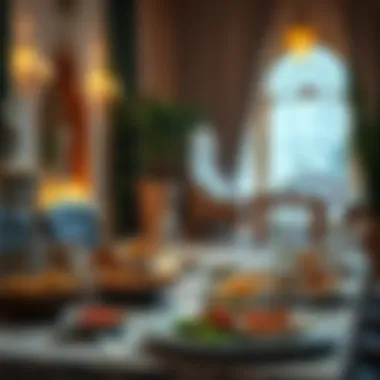
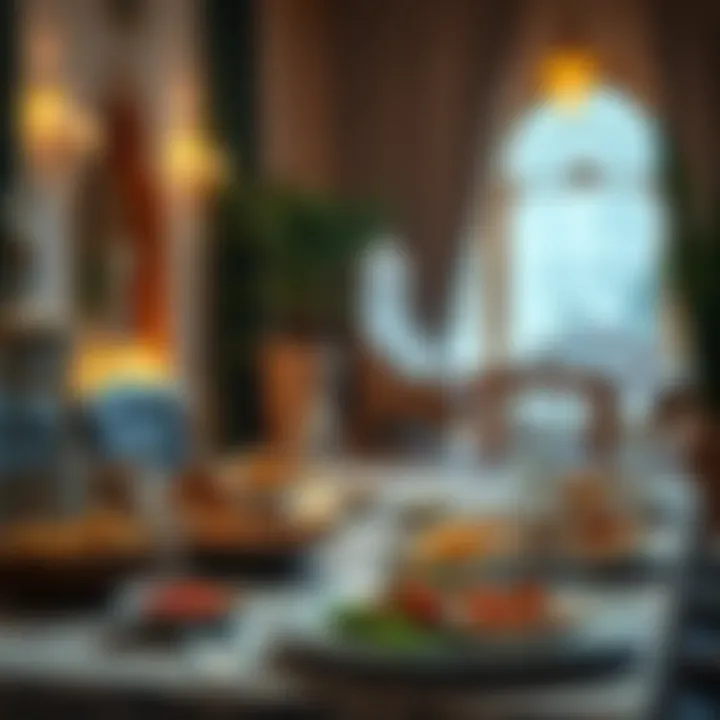
Local vs. Expatriate Observances
Observing Ramadan in Dubai varies markedly between the local Emirati population and the expatriates residing within the city.
- Local Traditions: For Emiratis, Ramadan is steeped in cultural heritage and religious significance. Traditional practices are woven into their daily lives, often involving numerous community activities, increased prayer attendance, and charity work. For them, Ramadan isn't just a month of fasting; it's a time for family and community strengthening.
- Expat Experiences: On the other hand, expatriates, who contribute to a significant portion of Dubai’s population, may approach Ramadan from differing angles. Their observances are colored by personal experiences and backgrounds. Some may fully integrate into the local traditions, while others may maintain their own cultural practices despite being miles away from home.
A common sight during Ramadan is expatriates joining local events and learning the customs that make the celebration unique in Dubai. These shared experiences create a vibrant atmosphere that encourages unity and respect among diverse cultures, offering both locals and expatriates a chance to learn and grow together through faith.
"Ramadan in Dubai is not just a month of fasting; it is a cultural tapestry woven with diverse threads, each adding depth to the communal fabric of this city."
For those immersed in this unique experience, the cultural education and relationship-building that occur during Ramadan in Dubai serve as a profound reminder of the shared values of kindness and respect, forming bonds that stretch beyond borders.
Cultural Significance of Ramadan
Ramadan holds a profound place in the hearts of millions around the globe, and in Dubai, it is no different. This sacred month is not merely a time for fasting; it represents an opportunity for individuals to engage in deeper spiritual reflection, foster community bonds, and cultivate a sense of compassion towards those less fortunate. In this cosmopolitan hub, the observance of Ramadan unfolds uniquely, mirroring the city's cultural diversity while remaining grounded in Islamic principles.
Spiritual Reflection and Growth
During Ramadan, Muslims intensively focus on spiritual growth and introspection. Fasting from dawn till dusk serves as more than a mere physical challenge; it's a pathway to purification of the soul. Individuals often disconnect from their daily distractions, allowing them to redirect their energy towards prayer and contemplation. This abstinence creates an environment where self-discipline thrives.
In Dubai, with its fast-paced lifestyle, this month encourages people to pause and reflect. Prayers become more frequent, with nightly Tarawih prayers gaining enormous participation in mosques across the city. There’s an unspoken camaraderie during this time—whether it’s sharing a moment of silence or a quick prayer—reminding everyone of their shared faith and experiences.
The atmosphere transforms at sunset. Families gather to break their fast, sharing not only meals but heartfelt conversations about personal growth and the lessons learned during the day. It’s said that during Ramadan, the heart softens. The focus on forgiveness, gratitude, and humility prevails. The spiritual vitality of this month often inspires a renewed faith that carries beyond Ramadan.
"Ramadan is not just a month of fasting; it's a chance to connect deeply with oneself and one's beliefs."
Community Involvement and Charity
Charity takes center stage during Ramadan in Dubai. The act of giving, known as Zakat, is emphasized and encouraged. Many engage in philanthropic activities, whether through monetary donations or food distribution. Local organizations, charities, and even individuals often organize Iftar meals for those in need, ensuring that no one has to break their fast alone or without food.
The city witnesses countless community Iftars, where people gather in public spaces to share food and fellowship. This not only strengthens community bonds but also highlights the essence of togetherness that Ramadan embodies.
Community-Based Initiatives:
- Iftar for All: Various groups host large community Iftars that welcome both Muslims and non-Muslims, fostering intercultural dialogue.
- Food Drives: There is a significant push for food collections to support the less fortunate, ensuring that they can also partake in the blessings of the month.
- Volunteer Opportunities: Many residents find joy in volunteering their time for local charities, whether it’s serving meals, organizing events, or distributing food parcels.
In Dubai, the spirit of Ramadan extends beyond just religious obligations. It's a time when the community comes together, reflecting on the importance of inclusivity, love, and generosity, allowing individuals from diverse backgrounds to participate in and experience the essence of the holy month together.
Impact on Daily Life During Ramadan
Ramadan in Dubai is not just a period of fasting and reflection; it significantly reshapes daily routines and social norms. For both locals and expatriates, the month demands adjustments that impact work, education, and even leisure activities. Understanding these changes is crucial for anyone living in or visiting Dubai during this sacred time. The essence of Ramadan permeates the lifestyle, offering unique insights into the city's culture and community dynamics.
Changes in Work Schedules
During Ramadan, most businesses in Dubai adapt their working hours to accommodate the fasting schedule. Typically, the workday begins later and ends earlier than usual. For instance, many offices may operate from around 9 AM to 3 PM, rather than the typical 8 AM to 5 PM schedule.
This shift allows employees to manage their fasting more effectively, providing them ample time to prepare for iftar, the meal that breaks the fast at sunset. The change in hours also applies to government offices and various public sector roles. It’s important for expatriates and new residents to recognize these adjustments; otherwise, they might find themselves caught off guard.
This flexibility reflects not just a practical response but also an acknowledgment of the spiritual and community significance of this holy month. It encourages a workplace culture that respects religious practices, fostering a sense of inclusivity.
Employers are often understanding and accommodating, offering additional breaks to help staff cope with fatigue. Some organizations even host iftar gatherings, allowing employees to celebrate communal ties and share the experience of breaking the fast together. In this way, the work environment during Ramadan shifts from being purely transactional to embracing a more holistic community spirit that enhances employee morale.
Adjustments in School Timings
Similarly, educational institutions make their own adjustments during Ramadan. Schools often shift their schedules to suit the needs of both students and teachers observing the fast. Classes may start later in the morning, around 9 AM or even 10 AM, to allow for a more manageable routine for children and their families.
In many cases, the school day is shortened, concluding around midday, which gives students time to return home and rest or prepare for iftar. This structure supports the well-being of young learners who might otherwise struggle with fatigue from fasting through long hours.
Parents and educators alike appreciate these changes. Schools tend to undertake special activities related to Ramadan, including discussions about its values, community service projects, and the spirit of giving—further instilling the cultural relevance of the month in students.
Such educational adjustments not only benefit students' health and focus but also create an environment where the values of Ramadan are embedded into their daily learning experience. As they learn about tolerance, compassion, and charity, they also participate in the community's traditions, reflecting the broader impact Ramadan has on Dubai's educational landscape.
Ramadan Customs and Traditions
Exploring the customs and traditions of Ramadan offers a window into both the spiritual and cultural fabric of Dubai. These practices shape the way individuals connect with their faith and their community during this holy month. Recognizing the importance of these customs not only enhances one's understanding of Ramadan but also enriches the experience for both residents and visitors.
Iftar: Breaking the Fast
Iftar, the meal served at sunset to break the fast, is more than just filling one's belly after a long day of abstinence; it symbolizes the end of a day filled with self-discipline. Traditionally, the fast is broken with dates and water, following the Sunnah of the Prophet Muhammad. Families and friends gather to share this moment, fostering connections that are at the heart of Ramadan.
The atmosphere during iftar can be electric, with bustling streets filled with the aroma of various cuisines wafting through the air. In Dubai, iftar experiences vary from home-cooked meals to lavish hotel buffets, where an international array of dishes showcase the city’s diversity. Visitors can find unique offerings, such as:
- Traditional Arabic dishes like Harees and Maqbous.
- Global influences such as sushi or Mediterranean delicacies.
During Ramadan, many restaurants offer special iftar menus that often come with an array of appetizers, main courses, and desserts, ensuring that everyone finds something to satisfy their taste buds. Importantly, some establishments even provide complimentary iftar meals for those in need, highlighting the charity aspect tied closely to this month.
"Iftar isn't just about the food; it’s a moment for reflection, togetherness, and gratitude."
Suhoor: Pre-Dawn Meal
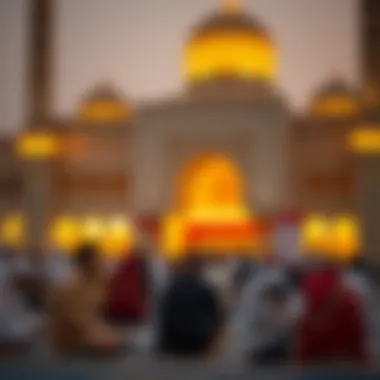
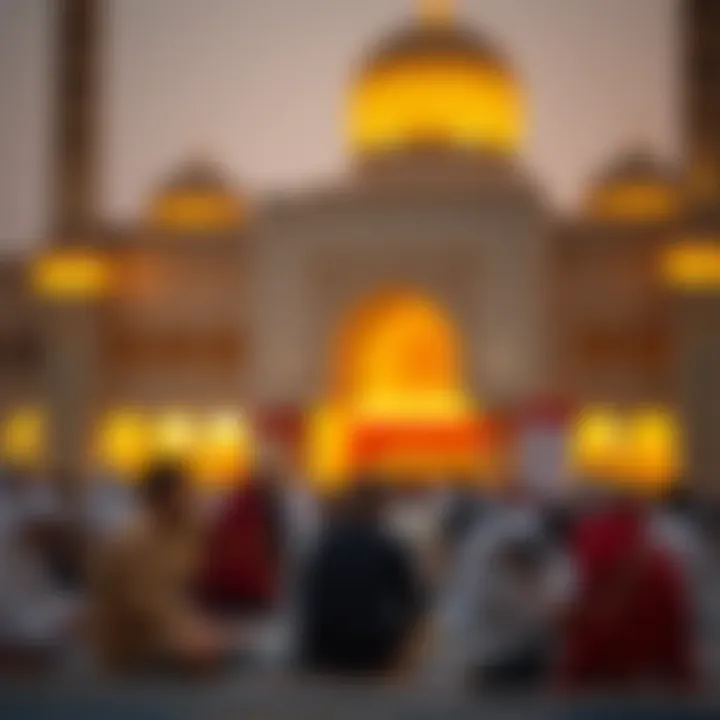
Suhoor, the pre-dawn meal, holds equal significance as it prepares the body for a day of fasting. Eating a balanced meal in the early hours is essential for staying energized until sunset. Traditionally, this meal generally includes heavy foods that release energy slowly, which may explain why dishes like foul medames (fava beans), lentil dishes, and various bread types are popular choices.
In Dubai, suhoor is also an opportunity for socializing, resembling a late-night gathering. Many eateries offer extended hours during Ramadan, catering to those looking to enjoy a meal before the sun peeks over the horizon. Unique variations of traditional foods like Shawarma and local sweets provide contrast to the simplicity of the meal, enhancing the overall dining experience.
It's not unusual to see groups of friends or families crammed into cafes and restaurants, reveling in a shared meal and exchanging stories before the fasting begins. This ritual encourages friendships, patience, and a shared understanding of the challenges that come with fasting. Thus, suhoor serves not just as a meal but as a bonding experience integral to the spirit of Ramadan.
The customs and traditions surrounding iftar and suhoor exemplify the communal aspects of Ramadan. They invite both residents and visitors to partake in a month rich with culture, spirituality, and togetherness, making Dubai a remarkable place to observe this significant time.
Religious Practices During Ramadan
The Ramadan period is not solely a month of fasting but is deeply intertwined with a variety of religious practices that enrich the observance for Muslims, particularly in a lively city like Dubai. This section will focus on the significance of increased prayer and reflection, as well as the communal aspects of Tarawih prayers, elaborating on how these activities help enhance the spiritual experience during this holy month.
Increased Prayer and Reflection
During Ramadan, Muslims are encouraged to step up their prayers and personal reflections. The intensity of worship magnifies, serving as a means to cultivate a deeper connection with God. Increased prayer isn't limited to the obligatory five daily prayers. Instead, many choose to dedicate more time to voluntary prayers known as 'Nafl.'
"In Ramadan, every action is amplified, providing a unique level of closeness to the divine that practitioners look forward to each year."
The night prayers, called 'Tahajjud', hold special significance. They are typically performed in the last third of the night and offer an opportunity for introspection and supplication. In Dubai, numerous mosques welcome those who wish to engage in these prayers, creating a vibrant atmosphere laden with spirituality. The community desires to give back through charity and good deeds, further transforming individual reflections into collective acts of kindness.
Tarawih Prayers and Community Gatherings
Tarawih prayers are a hallmark of Ramadan evenings in Dubai. Conducted after the obligatory 'Isha' prayer, these voluntary prayers commemorate the month. Mosques across the city become hubs of activity; it's a chance for families and communities to come together. The communal nature of Tarawih serves to bond individuals, fostering friendships and strengthening the spirit of togetherness.
The prayers may go on for an extended duration, sometimes lasting up to an hour or more, with the Quran being recited in sections throughout the month. Each night, devotees aim to listen to the recitation until the whole Quran is completed by the month’s end. This dedication to community worship illustrates how religious observance deepens not just personal faith but also enriches community ties.
Moreover, these gatherings often spill over from the confines of mosques into outdoor spaces, where iftars can be shared post-prayer. Food stalls and restaurants are lively and filled with people enjoying the festive atmosphere created by the coming together of diverse communities around faith. It’s more than just praying; it becomes a celebration of unity, spiritual edification, and cultural heritage.
In essence, the religious practices during Ramadan in Dubai not only fulfill spiritual duties but also create profound opportunities for social interaction, reflection, and community cohesion. This is essential for investors, homebuyers, agents, and expatriates who seek to understand how these dynamics shape the cultural fabric of Dubai during the holy month.
Economic Considerations During Ramadan
During Ramadan, the economic landscape in Dubai undergoes noticeable transformations shaped by cultural practices and the rhythm of daily life. This period, although rooted in spiritual significance, carries significant ramifications for businesses and the economy at large. Understanding these economic considerations is crucial, especially for investors and expatriates, as it provides insights into market fluctuations and consumer behavior during this pivotal time.
Impact on Local Businesses
As the sun dips below the horizon, signaling the end of the day’s fast, businesses in Dubai spring to life. Local enterprises, particularly in the food and hospitality sectors, see a notable uptick in customer activity. Restaurants and cafes often roll out lavish Iftar buffets, transforming the dining experience into a communal celebration.
- Businesses may experience:
- Increased Sales: Many establishments leverage Ramadan by offering special menus that attract both locals and expatriates eager to share meals with friends and family. The evenings are bustling, especially in popular districts like Al Seef and Downtown Dubai.
- Extended Hours: To accommodate the late-night dining crowd, many businesses adjust their operating hours, often staying open well into the early morning hours. This change not only meets customer demand but also increases foot traffic and profit margins.
- Cultural Products: Shops selling traditional attire, gifts, and sweets often see an increase in sales, reflecting the urge to prepare for Eid celebrations.
While such opportunities present potential economic boosts, businesses must also navigate challenges. Supply chain issues can arise as a result of increased demands, and not all businesses may be equipped to handle the sudden influx of customers. In essence, adapting to this season requires agility and foresight.
Real Estate Market Trends
The impact of Ramadan isn't confined to food and dining; it also echoes through the real estate sector. Many expatriates, influenced by cultural traditions and familial ties, often reassess their living situations during this month. The month typically heralds a quieter, but nonetheless significant, activity in the market.
- Rental Activity: Many families prefer to live in proximity to family during Ramadan, prompting some shifts in rental demand. Properties near mosques or community centers can see increased interest during this period.
- Property Sales: While the market may slow down in the lead-up to Ramadan, once Eid approaches, there can be a noticeable spike in inquiries as the festive mood inspires many to consider new investments or upgrades in housing.
- Annual Planning: Investors might also take this season as an opportunity to reassess their portfolios and rental agreements, especially when it comes to short-term leases which could appeal to tourists looking to experience Dubai during Ramadan.
Navigating the real estate market during this period requires awareness of the unique dynamics at play, as well as how cultural festivities can influence buyer behavior.
Understanding the economic implications of Ramadan not only helps in decision-making but also fosters a deeper appreciation of the cultural ties that bind the community during this holy month.
Dining and Hospitality During Ramadan
Dining and hospitality during Ramadan in Dubai carry immense significance, not only as a means of nourishment but also as a vital aspect of community interaction. As the sun sets, prayer calls echo through the streets, marking the moment of iftar — the fast-breaking meal. This practice is steeped in tradition and serves as a unifying force for families, friends, and even strangers who come together in a spirit of fellowship.
In Dubai, the dining scene during Ramadan transforms into a vibrant expression of cultural diversity. The city’s cosmopolitan nature means that you can find a variety of culinary experiences, ranging from traditional Emirati dishes to international cuisine, accommodating tourists and residents alike. The ambiance of restaurants during Ramadan is often both welcoming and festive, creating an inviting atmosphere that makes everyone feel included.
Moreover, this time of year significantly impacts local businesses, encouraging them to innovate in terms of menus and promotions. It’s an opportunity for restaurants to showcase their creativity while respecting cultural values. For investors and homebuyers, the bustling hospitality industry during Ramadan indicates a thriving market ripe for exploration.
As the month progresses, it’s worth noting that this is not just a time of eating; it is also about reflecting on communal values and the spirit of giving that Ramadan embodies. People actively seek ways to give back, often sharing their meals with those less fortunate, which fosters a sense of community responsibility across Dubai's diverse population.
Iftar Buffets and Special Menus
One of the standout features of dining during Ramadan is the extravagant iftar buffets offered throughout the city. Almost every restaurant, hotel, and even some homes prepare lush displays of food, presenting guests with a feast fit for royalty. These buffets often include traditional items like dates, lentil soup, bread, and an array of dishes that cater to diverse palates.
Many local and international hotels, such as the Burj Al Arab and the Jumeirah Beach Hotel, create unique dining experiences to entice guests. Their special menus often feature:
- Succulent grilled meats
- Aromatic rice dishes like biryani and pilaf
- Rich stews full of spices
- Decadent desserts, including baklava and umm ali
In the hustle and bustle of Dubai, these meals become more than just food; they are a gathering point where stories are shared, laughter resounds, and connections are formed. Visitors are encouraged to experience these buffets, as it amplifies the essence of Ramadan beyond individual fasting to a collective celebration.
Cultural Cuisine Exploration
Beyond the grandeur of buffets, Ramadan also provides a perfect opportunity for culinary exploration. Many residents and visitors take this time to appreciate the intricate flavors of different cultures that coexist within Dubai. From Moroccan tagines to Indian curries, and from Iranian kebabs to Filipino adobo, the tastes of Ramadan reflect a rich tapestry of global influences.
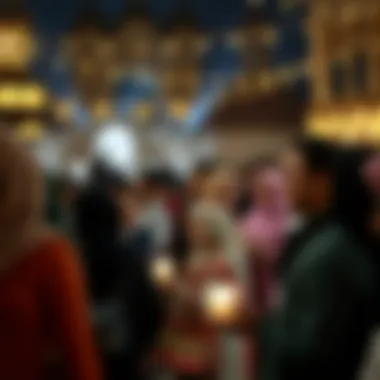
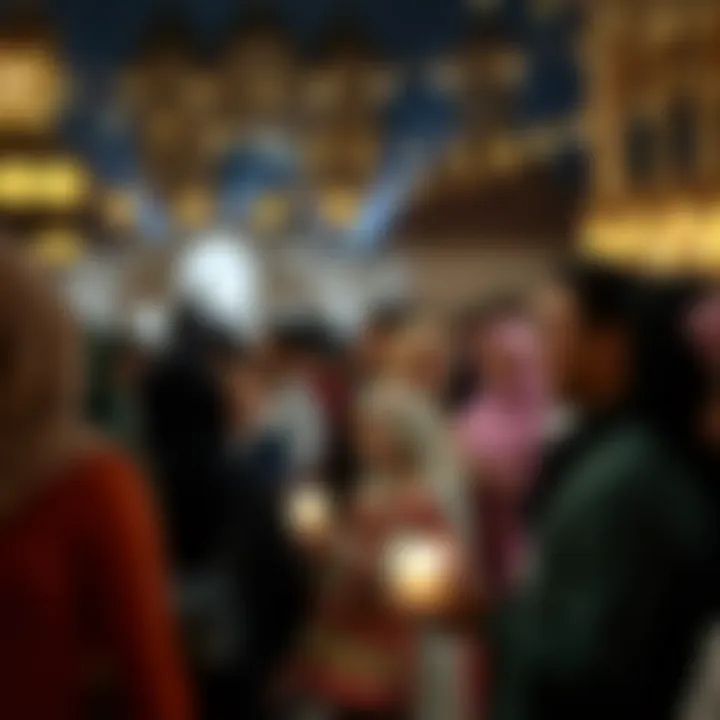
Food tours and cultural nights during this month are becoming increasingly popular. Some restaurants even host cooking classes where participants can learn to create traditional dishes, fostering a deeper understanding of the cultural significance behind each recipe.
While dining at these culturally inspired menus, consider:
- The stories behind dishes and their origins
- How these meals align with Ramadan's themes of abundance and gratitude
- Opportunities to engage in community eating experiences, which often include cultural performances or storytelling
This immersion in Dubai’s culinary landscape not only enhances one’s understanding of Ramadan but also builds connections among its diverse residents and visitors. In this melting pot, every meal becomes an avenue for appreciating the multicultural fabric of the city.
Social and Community Events
Social and community events during Ramadan in Dubai serve as a pivotal aspect of the month’s cultural fabric. With a diverse population, the city showcases an amalgamation of traditions, fostering a sense of unity and purpose during the holy month. These events not only enhance spiritual experiences but also provide essential networking opportunities for expatriates, investors, and homebuyers who want to immerse themselves in the local culture.
The vibrancy of these gatherings can��’t be understated, as they exemplify the essence of communal life, encouraging individuals from various backgrounds to come together. Whether it’s large gatherings for Iftar or cultural programs aimed at increasing understanding, these events embody the spirit of sharing, generosity, and compassion.
Community Iftar Gatherings
Iftar gatherings in Dubai attract individuals from all walks of life, creating an inclusive environment that draws locals and expatriates alike. These communal meals often take place in public spaces, mosques, and even open streets, contributing to a festive atmosphere.
"Iftar gatherings are open to everyone, illustrating the ethos of hospitality that defines Ramadan in Dubai."
The preparation for these events involves collaboration from local businesses, which contribute food and resources. The spirit of giving and community involvement creates a warm ambience, ideal for breaking the fast.
- Key Highlights of Community Iftar Gatherings:
- Inclusive Atmosphere: Everyone is welcomed, providing a platform for cultural exchange.
- Variety of Foods: Traditional dishes from various cultures reflect the city's diversity.
- Networking Opportunities: A chance for expatriates and locals to connect, beneficial for investors and homebuyers looking to build relationships.
Cultural Awareness Initiatives
Cultural awareness initiatives gain traction during Ramadan, aimed at facilitating better understanding among the diverse groups residing in Dubai. Workshops, seminars, and exhibitions often focus on educating both expatriates and locals about the significance of Ramadan and Islamic traditions. This is especially important for newcomers to the emirate, who may not be familiar with local customs.
These initiatives help demystify Ramadan practices and highlight the values of tolerance, compassion, and respect. They provide an excellent opportunity for expatriates who wish to engage meaningfully with the local community, thereby enhancing their overall living experience.
- Notable Aspects of Cultural Awareness Initiatives:
- Educational Workshops: Covering topics such as fasting, prayer, and cultural traditions.
- Collaborative Events: Partnerships between different cultural groups promoting mutual respect.
- Engagement Activities: Encouraging participation in local traditions, making it easier for investors and homebuyers to feel at home.
Engaging in these social events can bring a wealth of understanding and appreciation for the Ramadan experience in Dubai. For investors, agents, and expatriates, participating in such gatherings not only enhances communal ties but also opens doors to potential opportunities in the culturally rich landscape of Dubai.
Challenges and Considerations
During Ramadan in Dubai, unique challenges and considerations arise for residents and visitors alike. Understanding these aspects helps foster a respectful environment during this holy month. For those unfamiliar with the cultural intricacies, navigating through Ramadan can feel like walking through a maze. However, by acknowledging these challenges, one can participate more meaningfully and avoid cultural missteps.
Cultural Sensitivity for Visitors
Cultural sensitivity is paramount, especially for visitors in Dubai during Ramadan. The holy month represents a time for spiritual reflection, devotion, and community engagement. For expatriates and tourists, it’s essential to respect the local customs. Visitors must approach the situation with an open mind and a willingness to adapt.
Here are some practices to consider:
- Dress Modestly: While Dubai is a cosmopolitan city, modest attire is still encouraged in public places during Ramadan. This demonstrates respect for Islamic traditions.
- Avoid Eating or Drinking in Public: Consuming food or beverages in public places can be seen as disrespectful during fasting hours. Instead, opt for private venues or designated areas.
- Embrace the Spirit of Ramadan: Participate in community events or Iftar gatherings if invited. This shows appreciation for the local culture and allows for deeper understanding.
By being culturally aware, visitors can connect with the community, enriching their experience while respecting the values of Ramadan.
Navigating Restrictions and Regulations
Navigating through the myriad restrictions and regulations during Ramadan can be tricky for outsiders. Businesses, too, adapt to the rhythm of the month, which affects operating hours and services. Being informed can save one from surprises and help maintain a respectful atmosphere.
Key points to remember include:
- Change in Operating Hours: Many shops, restaurants, and entertainment venues adjust their hours. It’s wise to check opening times before planning a visit.
- Public Behavior: Public displays of affection or loud music are discouraged during the holy month. Maintaining a low profile respects the solemnity of the time.
- Communal Compliance: There are government regulations in place that promote lawful observance of Ramadan practices. Understanding the legal requirements can protect one from unintentional breaches.
In essence, navigating the restrictions during Ramadan requires attentiveness to local customs and laws, fostering a respectful coexistence in this vibrant city.
Respecting these cultural nuances can enhance one's experience and promote mutual understanding. Participating in Ramadan means more than mere observance; it’s about embracing a different way of life, if only for a month.
The Future of Ramadan Observances in Dubai
As the cultural landscape of Dubai continually shifts, the way Ramadan is observed is also evolving. Understanding the future of Ramadan observances in this cosmopolitan city is paramount, especially for investors, homebuyers, and expatriates looking to integrate seamlessly into local traditions. Cultural and religious practices hold a strong sway over daily life here, and recognizing how these customs adapt will give a clearer picture of what to expect in the years to come.
The significance of this topic lies not only in the preservation of traditions but also in how these traditions are reshaped by modern influences. Embracing change while honoring age-old customs reflects a balance of respect and innovation.
Evolving Practices and Attitudes
In recent years, there's been a noticeable shift in how Ramadan practices are approached. Younger generations, influenced by global trends and digital connectivity, are more inclined to blend traditional observance with modern lifestyles. For example, social media engagements during Ramadan have risen sharply. People share their iftar meals or send Eid greetings through platforms like Instagram or Twitter, creating a rich tapestry of shared experiences that spans continents.
Moreover, local communities have begun hosting innovative events aimed at improving engagement among diverse cultures. Think of things like outdoor iftars in parks or community art projects reflecting Ramadan themes. The goal is to provide an inclusive atmosphere that celebrates both the spiritual and social dimensions of this holy month.
Integration of Technology into Celebrations
Technology plays a pivotal role in shaping the future of Ramadan observances. The integration of mobile apps to track prayer times and fasting schedules has become commonplace. These applications make it easier for people to stay connected with their spirituality even amidst busy lives.
One of the most notable advancements is the usage of platforms for virtual iftars, allowing families and friends to come together despite geographical distances. This digital shift isn’t just a trend; it reflects a fundamental change in how people connect and engage during Ramadan.
Additionally, local businesses have started leveraging technology to enhance the Ramadan experience. For instance, restaurants are launching online pre-order options for iftar meals, catering to the busy lives of expats and residents alike. This demand for convenience shows that tradition can exist harmoniously alongside modern expectations.
"The way Ramadan is celebrated reflects not just the past, but also our hopes and adaptations for the future."

